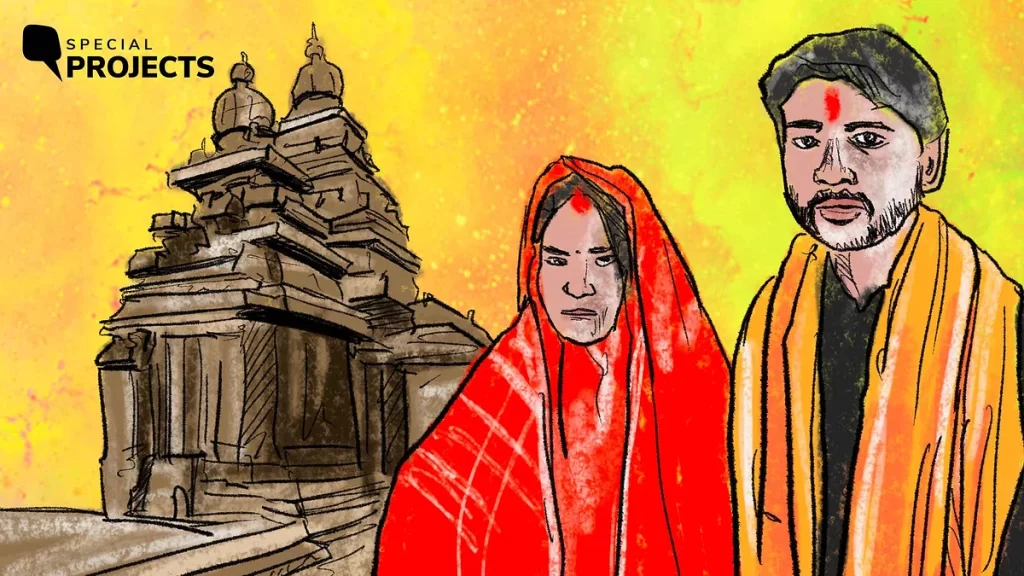What is the price of ‘forbidden’ love – opposition from families, harassment, social ostracisation? Aqib, 24, and Manvi, 22, (names changed to protect identity), an interfaith couple from Bharatiya Janta Party (BJP)-ruled Madhya Pradesh’s Dindori district, are paying a bigger price.
A year since they got married in April 2022, Aqib and Manvi have been on the run. “The society still holds a grudge against us and our relationship because we don’t practice the same religion. Even a year later, we do not feel safe,” Manvi told The Quint.
Even Aqib’s family wasn’t spared. Around the same time, his family of eight was humiliated, stripped of their dignity, and their only home demolished.
This despite the Madhya Pradesh High Court granting protection to the interfaith couple, who are two consenting adults, on 23 April 2022, stating “they have a right to choose the life partner of their choice.”
This is the story of the price they had to pay for their love.
The Phone Call That Changed Aqib’s Life
Aqib and Manvi met and fell in love in school. They had known each other for 10 years before they professed their love for each other. By then, Aqib had started work as a driver with a government official, and Manvi was pursuing a Masters of Arts degree.
“My family had a fair idea about our relationship but I formally told them that I wanted to marry him in March 2022. They knew of Aqib because he had come to our house a few times. My mother refused outright, saying he wasn’t a Hindu. My brother threatened to kill Aqib,” said Manvi.
Things escalated quickly after Manvi told her parents about her relationship. Furious, they sent her to her bua’s (aunt’s) house in the Kundam area of the neighbouring Jabalpur district.
Manvi alleged that she was harassed by her family members and wasn’t allowed to leave the house for a month. “I was in shock, pain, and despair.I would spend my days crying,” she told The Quint.
On the night of 3 April 2022, however, with her face covered with a white scarf, Manvi escaped through the terrace of the house.
“One day, I saw my aunt locking the door of the terrace. I figured where she hid the keys. A few days later, I sneaked out of my room early morning, grabbed the keys, and let myself out through the terrace. I jumped onto the roof of the adjoining house, and then climbed down an iron staircase to escape from the house,” Manvi narrated.
Overwhelmed with her own decision, Manvi walked away from her bua’s house in the wee hours of 4 April in tears. She then borrowed a phone from two passers-by and called Aqib.
“I hadn’t spoken to Manvi for a month. So, on 4 April, when my phone rang early in the morning, I was a little terrified. I picked up the phone, and on the other side, it was Manvi. She told me that she was waiting for me on the side of the road. ‘I will die but won’t go back to my parents’ house,’ she told me over the phone. I did what anyone would have done…”, Aqib told The Quint.
“I went to Jabalpur, picked her up, and since then, I have been with her at every turn,” said Aqib.
Cycle of Humiliation, Defamation, Repression
The day Aqib and Manvi reunited in Jabalpur, the cycle of humiliation, defamation, and repression began for Aqib’s family in Dindori.
On 5 April, Manvi’s brother Mohit filed a complaint, in which he alleged that his sister had been kidnapped by Aqib.
Mohit owns a mobile phone store in Dindori. The Quint reached out to him multiple times over the past one month but he refused to comment, and only said, “No one in the family is in contact with Manvi.”
On the basis of his complaint, a case was registered against Aqib in Dindori’s Shahpura police station under sections 363 (punishment for kidnapping) and 386 (extortion by putting a person in fear of death or grievous hurt) of the Indian Penal Code (IPC).
Soon after, the police began their search for the couple. By this time, the couple had driven to Shahdol, roughly 100 km away from Dindori.
Aqib’s father Habib (name changed to protect identity) recounts talking to the couple over the phone at 10.48 am on 4 April. He claimed that he advised them to return to Dindori immediately. “I told them that the matter has taken a communal turn but Manvi didn’t want to return.”
On 5 April, the police summoned Habib to the Shahpura police station and allegedly coerced him to reveal their whereabouts.
“I didn’t know where they were. I was worried. The situation was worsening. The narrative was that a Muslim man had kidnapped a Hindu woman. We feared for our lives and that of our children’s because by then, the Hindu right-wing groups had intervened,” Habib told The Quint.
Habib recounted that when he called up the couple again from the police station, a personnel told them to return to Dindori but they refused.
“We were petrified but never thought things will escalate this quickly. My family filed a police case, the police were searching for us, Aqib was charged with my abduction… but I feared for his life and mine, and so we couldn’t return…”, said Manvi.
From Shahdol, Manvi and Aqib drove to Dantewada, Chhattisgarh.
Even as Habib was allegedly still held at the police station, there was growing clamour from the right-wing groups for the administration to “take action” against Aqib’s family.
A controversial law in the state – the Madhya Pradesh Freedom of Religion Act, 2021 – aims to prevent forcible or fraudulent religious conversions with the promise of marriage. But it is often used as a tool to criminalise interfaith marriages by right-wing groups who refer to them as “love jihad.”
A Wedding and a Demolition
On 7 April, Manvi and Aqib tied the knot at a temple in Dantewada.
On the same day, the district administration of Dindori demolished three shops belonging to Habib’s family, citing “illegal construction.”
Hours later, former BJP minister Om Prakash Dhurvey, the party’s district president Narendra Singh Rajput, and several other protesters blocked National Highway 45, demanding “bulldozer action” on Aqib’s house.
“Bulldozer action” colloquially refers to the use of heavy machinery by the state to demolish houses or shops of alleged miscreants or gangsters. The move has been used extensively in Uttar Pradesh, but the controversial ‘policy’ has seen increasing use in other states, including Madhya Pradesh.
The district collector and the sub-divisional magistrate of Dindori met with the protesters, and the next day, on 8 April, Aqib’s house, which was under the name of his father Habib, was demolished.
The state government claimed that the house was built on government land – and that there was no connection between its demolition and the charges levelled against Aqib.
“It is relevant here to mention that the FIR against the petitioner no. 2 (Aqib) was registered on 5 April 2022, whereas proceedings under section 248 of Madhya Pradesh Land Revenue Code were initiated against the father of petitioner no. 2 (Aqib) on 25 March 2022,” the state government noted.
They also claimed that Habib was told to appear on 30 March, and that the final demolition orders were passed on 6 April, a day after the FIR was lodged.
The official handle of the district collector, however, had tweeted right after the demolition: “Collector Mr Ratnakar Jha has razed the shop and house of Aqib Khan, accused in the kidnapping of a girl student in Dindori district…”
Manvi alleged to The Quint that the administration “razed Aqib’s house indiscriminately – and punished his family for a crime they didn’t commit.” She had recorded a video and shared it with her acquaintances and journalists, seeking their help to forward it to all authorities concerned.
“I told them that I have come of my own accord, and that Aqib hasn’t abducted me… And that I wanted to be with him and marry him. But no one was listening. There was a lot of pressure from the right-wing groups and so my voice, my side of the story, went unheard. They demolished Aqib’s house anyway. It would have been the home where I would have married and lived.”
As the demolition cast its shadow, Aqib and Manvi didn’t feel safe in Dantewada. They were on the move at all times but remained tight-lipped about their location – lest the police force Aqib’s family to reveal it.
“We thought tying the knot would make us inseparable. But with the demolition of Aqib’s house and shops, we knew the situation was far from getting better,” Manvi told The Quint.
A fortnight later, they couldn’t carry on – and decided to seek protection from the court.
When the Court intervened
On 18 April, Manvi recorded a statement in front of a single-judge bench, headed by Justice Nandita Dubey of the Madhya Pradesh High Court. “I told her I have come with Aqib of my own volition – and there is no case of abduction as was being portrayed.”
In a win for Manvi and Aqib, on 22 April, the High Court noted that the petitioner (Manvi) is “a major who married 24-year-old Aqib willingly.”
In her plea, Manvi had also alleged that they feared for their lives, and further troubles from her family, the right-wing groups, and people from her community, to which the court said that “the police will ensure their protection.”
Manvi then gave a written statement to the police: “We both decided that our family members are not agreeing for marriage and both of us are in danger and so we should go and get married… After we both left home, our family and members of our community turned into a communal issue and filed a report against my husband in Shahpura police station and my father-in-law’s house and shop were bulldozed [sic].”
Her statement – and the court’s order – led to the dismissal of the kidnapping case against Aqib. “Since the woman, Manvi, who was said to be kidnapped had said in front of the honourable High Court that she went with Aqib on her own accord, the case was closed from our end. Following the directions of the High Court, we took her statement and closed the case [sic],” Akhilesh Dahiya, in-charge, Sahpura police station told The Quint.
Starting a New Life in Dindori
The nulling of the case against Aqib – and a court-ordered protection – gave the couple the courage to return to Dindori. But their stint there didn’t last long.
“In our short time in Dindori living as a married couple, the society’s attitude towards us didn’t change. We feared not only for ourselves but also for Aqib’s siblings, his mother and father. Our decision to marry had cost them dearly,” said Manvi.
After five months of struggle, the couple decided to leave Dindori.
Meanwhile, Habib, who had put his blood and sweat into building the house for his three sons and three daughters, bemoans his loss every day. “The irony is that the collector and the officials told me that they had demolished my house for the crimes of my son. But when we filed a complaint in the court, they said that the construction was illegal. We were not given any notice, and I was held in the police station when the authorities demolished my house. Today, we are living in a rented house – and struggling to survive.”
He added that two of his children could not appear for their exams, and had to skip an academic year.
Aqib’s mother Ameena (name changed to protect identity), a homemaker who contested the local councillor elections in 2015, said that “by bulldozing our house, the family’s reputation and respect has been tarnished forever.”
“They (district administration) don’t know what they have done. They branded my son a kidnapper, accused him of manipulating my daughter-in-law, and didn’t want to hear anything from us…” Ameena told The Quint.
“It wasn’t just the brick and mortar that they pulled down. They destroyed a happy family. They crushed the hopes of my children, they dented their education and bulldozed the idea of a normal life,” added Habib.
1,100 km Away but Always Alert
“We know the right-wing groups can’t hurt us here but we can’t take chances,” Aqib told The Quint over the phone without revealing his and Manvi’s current location.
“I am always on alert, checking the locks of the main door twice, asking Manvi to lock behind me every time I leave the house,” he said.
Aqib is currently employed as an office boy in a private company and earns Rs 15,000 monthly. “It’s very hard to make ends meet,” he said.
Manvi, too, wants to start working but her documents are with her family. “I am finding it hard to get them back,” she said. “As soon as I do, I will finish my Master’s degree and look for a job. I know in today’s times, it’s tough for Aqib to manage everything on his own. We are partners – and we want to rebuild our lives together.”
Manvi has tried reconnecting with her mother a few times. “Even if she talks to me, she is not ready to accept my marriage.” But she is quick to add that “societal pressure” might have pushed her relations with her mother to the “point of no return.” On the other hand, Manvi and her mother-in-law Ameena have grown close, finding solace in each other by talking to each other every day. “As a woman, I can understand what my mother-in-law is going through. I can’t be there physically with them but we talk every day. I tell her about myself and Aqib and how we spent our day, while she tells me about her day,” she said.
Meanwhile, Ameena said, “We are not living under the same roof but Manvi is my family. My only regret is that I could not welcome her like I would have liked to… I had big dreams for Aqib’s wedding… I wished to dance to my heart’s content.”
Despite all odds, Aqib and Manvi have managed to find comfort in the fact that they are together.
“Love is a powerful thing. If you love someone, you can do everything for them, with them. In my case too, all the strength, the willpower, and the courage to fight against all odds have come from the love between us. I have chosen him as my life partner, and we will sail through all the tides,” said Manvi.
“We imagined a happy married life with our families, but in our case, we don’t even have a house. My only wish is that my parents get their house back – and we get justice. Loving someone should not take away our house, our lives,” said Aqib. “But I will do anything for her. We are destined to live together through thick and thin.”
(Courtesy: The Quint.)




